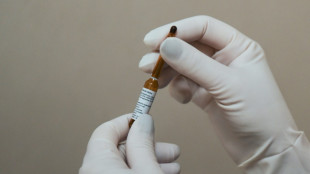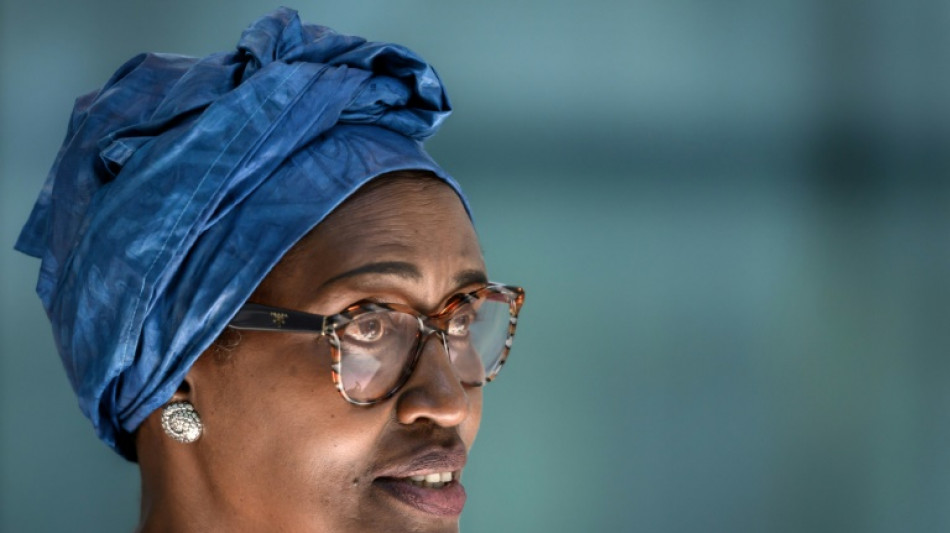
-
 Where Trump's tariffs could hurt Americans' wallets
Where Trump's tariffs could hurt Americans' wallets
-
Trump says 'very close to a deal' on TikTok

-
 Trump tariffs on Mexico: the good, the bad, the unknown
Trump tariffs on Mexico: the good, the bad, the unknown
-
Postecoglou denies taunting Spurs fans in Chelsea defeat

-
 Oscar-winning Palestinian director speaks at UN on Israeli settlements
Oscar-winning Palestinian director speaks at UN on Israeli settlements
-
With tariff war, Trump also reshapes how US treats allies

-
 Fernandez fires Chelsea into fourth as pressure mounts on Postecoglou
Fernandez fires Chelsea into fourth as pressure mounts on Postecoglou
-
South Korea court to decide impeached president's fate

-
 Penguin memes take flight after Trump tariffs remote island
Penguin memes take flight after Trump tariffs remote island
-
E.T., no home: Original model of movie alien doesn't sell at auction

-
 Italy's Brignone has surgery on broken leg with Winter Olympics looming
Italy's Brignone has surgery on broken leg with Winter Olympics looming
-
Trump defiant as tariffs send world markets into panic
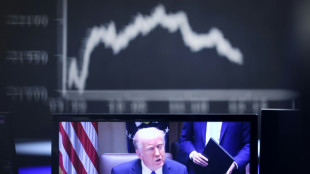
-
 City officials vote to repair roof on home of MLB Rays
City officials vote to repair roof on home of MLB Rays
-
Rockets forward Brooks gets one-game NBA ban for technicals

-
 Pentagon watchdog to probe defense chief over Signal chat row
Pentagon watchdog to probe defense chief over Signal chat row
-
US tariffs could push up inflation, slow growth: Fed official

-
 New Bruce Springsteen music set for June 27 release
New Bruce Springsteen music set for June 27 release
-
Tom Cruise pays tribute to Val Kilmer

-
 Mexico president welcomes being left off Trump's tariffs list
Mexico president welcomes being left off Trump's tariffs list
-
Zuckerberg repeats Trump visits in bid to settle antitrust case

-
 US fencer disqualified for not facing transgender rival
US fencer disqualified for not facing transgender rival
-
'Everyone worried' by Trump tariffs in France's champagne region

-
 Italy's Brignone suffers broken leg with Winter Olympics looming
Italy's Brignone suffers broken leg with Winter Olympics looming
-
Iyer blitz powers Kolkata to big IPL win over Hyderabad

-
 Russian soprano Netrebko to return to London's Royal Opera House
Russian soprano Netrebko to return to London's Royal Opera House
-
French creche worker gets 25 years for killing baby with drain cleaner

-
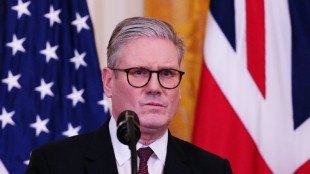 UK avoids worst US tariffs post-Brexit, but no celebrations
UK avoids worst US tariffs post-Brexit, but no celebrations
-
Canada imposing 25% tariff on some US auto imports
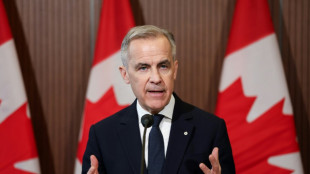
-
 Ruud wants 'fair share' of Grand Slam revenue for players
Ruud wants 'fair share' of Grand Slam revenue for players
-
Lesotho, Africa's 'kingdom in the sky' jolted by Trump
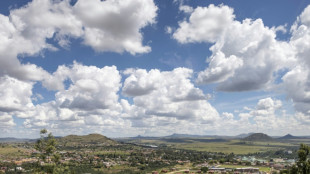
-
 Trump's trade math baffles economists
Trump's trade math baffles economists
-
Gaza heritage and destruction on display in Paris

-
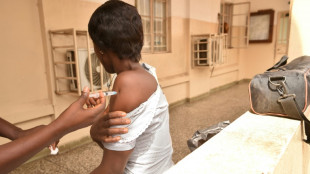 'Unprecedented crisis' in Africa healthcare: report
'Unprecedented crisis' in Africa healthcare: report
-
Pogacar gunning for blood and thunder in Tour of Flanders

-
 Macron calls for suspension of investment in US until tariffs clarified
Macron calls for suspension of investment in US until tariffs clarified
-
Wall St leads rout as world reels from Trump tariffs
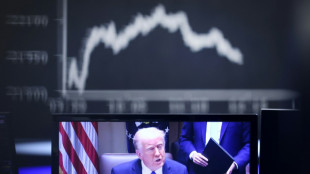
-
 Mullins gets perfect National boost with remarkable four-timer
Mullins gets perfect National boost with remarkable four-timer
-
Trump tariffs hammer global stocks, dollar and oil

-
 Authors hold London protest against Meta for 'stealing' work to train AI
Authors hold London protest against Meta for 'stealing' work to train AI
-
Tate Modern gifted 'extraordinary' work by US artist Joan Mitchell

-
 Mexico president welcomes being left off Trump's new tariffs list
Mexico president welcomes being left off Trump's new tariffs list
-
Tonali eager to lead Newcastle back into Champions League

-
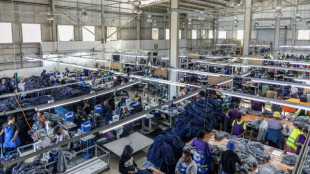 Lesotho hardest hit as new US tariffs rattle Africa
Lesotho hardest hit as new US tariffs rattle Africa
-
Stellantis pausing some Canada, Mexico production over Trump auto tariffs

-
 Rising odds asteroid that briefly threatened Earth will hit Moon
Rising odds asteroid that briefly threatened Earth will hit Moon
-
Italy reels from Brignone broken leg with Winter Olympics looming

-
 Is the Switch 2 worth the price? Reviews are mixed
Is the Switch 2 worth the price? Reviews are mixed
-
Ancelotti’s tax trial wraps up in Spain with prosecutors seeking jail

-
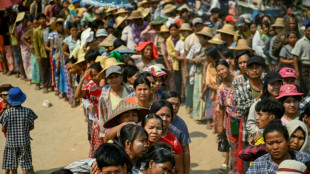 Civilians act to bring aid to Myanmar earthquake victims
Civilians act to bring aid to Myanmar earthquake victims
-
US trade gap narrows in February ahead of bulk of Trump tariffs


Global fight against HIV 'In Danger' amid resource crunch, says UN
The global fight against HIV has stalled from shrinking resources due to Covid-19 and other crises, according to a new report presented at the International AIDS Conference in Montreal, Canada.
Across the world, new HIV infections fell just 3.6 percent between 2020 and 2021, the smallest annual drop since 2016, said the UNAIDS report, titled "In Danger."
Some 1.5 million new infections occurred last year –- more than a million over global targets of fighting the virus.
"The response to the AIDS pandemic has been derailed by global crises from the colliding pandemics of HIV and Covid, to the war in Ukraine and the resulting global economic crisis," UNAIDS executive director Winnie Byanyima told reporters.
New infections climbed in Eastern Europe, Central Asia, the Middle East, North Africa and Latin America, in line with trends over several years.
Asia and the Pacific saw a slight rise, bucking previous declines.
Bright spots included western and central Africa -- the latter driven largely by Nigeria -- and the Caribbean.
"Covid-19 and other instabilities have disrupted health services in much of the world, and millions of students have been out of school, increasing their HIV vulnerability," the report said.
Globally, 38.4 million people were living with HIV in 2021, with 650,000 deaths from AIDS-related illnesses.
Young women and adolescent girls were disproportionately impacted, with a new infection occurring in this population every two minutes.
Sub-Saharan Africa still accounts for the majority of new infections -- 59 percent in 2021 -- but that proportion is decreasing as the decline in new cases slows in the rest of the world.
- Fatigue and Ukraine war -
The report comes as high-income countries are cutting back aid.
In 2021, international resources available for HIV were six percent lower than in 2010, with bilateral assistance from the United States down 57 percent over the past decade.
The UN says the HIV response in low- and middle-income countries is $8 billion short of the amount needed by 2025.
Anthony Fauci, the United States' top infectious disease official, said he was worried that fatigue over HIV was holding back resource allocation.
"When you have the disease that we have been addressing as a community, now over 40 years, even that alone is a tough sell to keep the enthusiasm up," he said.
With Covid and monkeypox added to the mix, "people are exhausted with epidemics and pandemics, so I think our challenge is we have to fight twice as hard to get HIV back on the radar screen," he added.
Andriy Klepikov, executive director of the Alliance for Public Health, an AIDS advocacy group in Ukraine, called for special attention to his country in light of the invasion by Russia.
"Over 100,000 people living with HIV are actually living in areas directly affected by the war," he said, stressing the need for more funds from the United States' PEPFAR program for HIV as well as from UNAIDS.
- Racial disparities -
Seventy percent of cases globally were reported in key populations: sex workers and their clients, men who have sex with men, people who inject drugs, and transgender people.
The report also called attention to racial inequality as an exacerbator of HIV risks.
In the United Kingdom and United States of America, Black people lag white people in declines in new infections. In Australia, Canada and the United States, HIV acquisition rates are higher in Indigenous communities.
The report also showed that access to life-saving treatments is faltering, growing by its slowest rate in over a decade.
Three-quarters of all people living with HIV had access to antiretroviral treatments, but 10 million people do not.
The rate of global new infections has declined since peaking in the mid-1990s, but there is far to go in order to achieve the global goal of ending AIDS by 2030.
"We can end AIDS by 2030, but the curve will not bend by itself," said Byanyima, urging countries to heed the call to action.
F.Pedersen--AMWN
